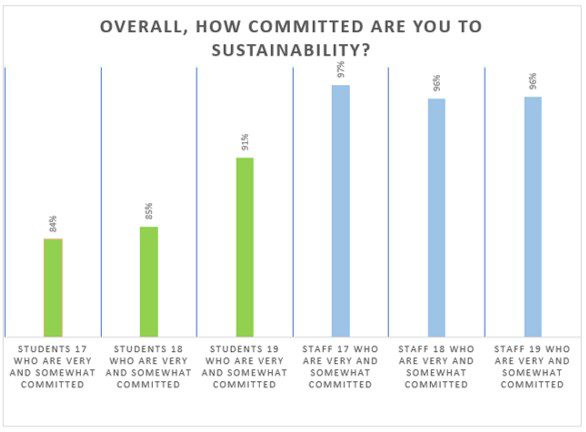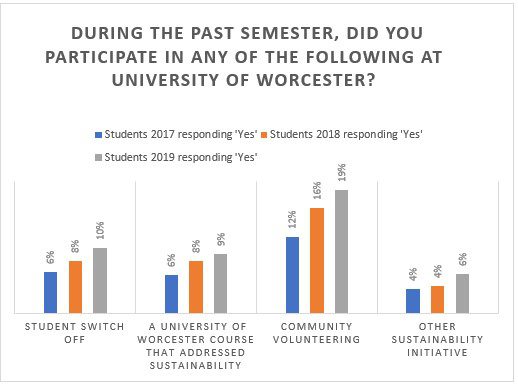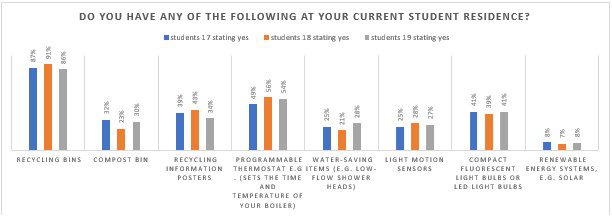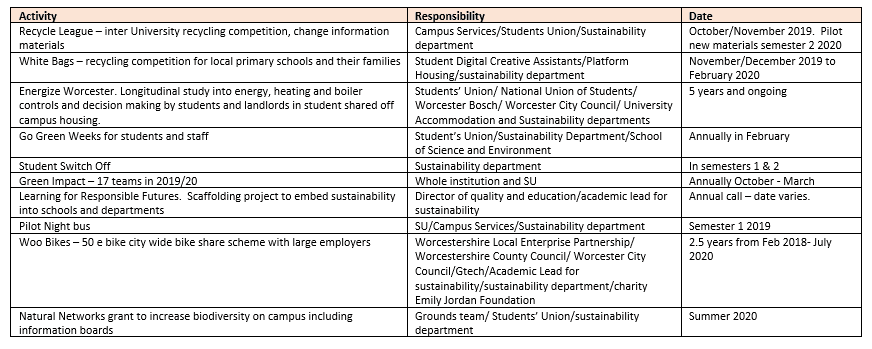Changes in the University of Worcester’s student and staff attitudes to sustainability is shown through a report which draws on findings from a series of surveys from the last three years.
The questionnaires that took place between 2017 and 2019 gives a gradual movement towards a fuller understanding of the University’s sustainability activities and greater personal sustainable practice amongst students and staff.
Positively, when looking at the student commitment to sustainability, there has been an uplifting response with 91% of student participants claiming they are very and somewhat committed; this is a rise of 6% from the year before.
There was no change in the 96% of staff respondents who state they are ‘very’ and ‘somewhat’ committed to sustainability from the year before.
Table 1: How committed staff and student populations are to sustainability

Individual commitment to sustainability
Positively there has been an increase in students participating in sustainable activities. Since 2017 there has been a 7% rise of students doing community volunteering, a 4% rise of students participating with the student switch off and a 3% rise of students doing a course that addresses sustainability.
This may be a result of the students’ union becoming more involved with sustainable efforts, including a larger interaction with Go Green Week and also by running its own projects such as signing up to ‘plastic-free Worcester’, gaining accreditation through the NUS green impact award, delivering ‘green training’ to staff and much more.
Table 3: Student participation in sustainability activities.

Knowledge of ‘Sustainability’ efforts on campus
In this data, we can say that recycling efforts on campus are consistently around 50% or above for both student and staff populations. In order to improve recycling rates on campus, this year a poster was by and for students as part of the NUS/Coca Cola National Campaign.
Knowledge of disposing of food waste for students has fluctuated but has yet seen a 6% rise in students knowing ‘a lot’ or ‘a fair amount’ since 2018. As for staff levels of knowledge, there has been a decrease, falling by 15% since 2017. This could correlate with students being provided with caddies if they live in university halls and staff only have caddies if they specifically request them.
Levels of recycling electronic waste are consistently lowered across all 3 survey years for the staff populations, with only 22% of staff in 2019 knowing ‘a lot or a fair amount’. Meanwhile, although a low percentage, there is a 12% rise of students who have knowledge of how to dispose of these items on campus. This may be due to 2019 introducing more battery recycling bins across campus, including in the student’s union.
Student accommodation and sustainability
The data shows a 9% fall of recycling information posters being placed in a student residence and a 6% fall in recycling bins in student residency.
6 out of 8 responses have stayed around the average percentage or increased slightly and only 8% of students have renewable energy systems in their accommodation, which remains a disappointing amount.

Individual action for sustainability
Positively the data from the student population shows every single one of the 2019 responses has had an increase in those claiming they participate in these actions always/most of the time.
The evidence presented suggests that staff and student perceptions of sustainability on campus are generally positive, but the staff population has shown a decrease in knowledge of the sustainability efforts being made on campus. Whilst the staff’s commitment to the environment stays the same, the student population results show an increase in interest, attitude, and interaction when it comes to sustainable effort, activities, and action.
A range of actions have been identified to tackle the key issues identified in the final report which is available here.

Hi, This is great to see! Are you, yourself, passionate about sustainability and do you actively and successfully avoid buying avoidable single use plastic for example when food shopping? I am looking for nationwide volunteers of University age to participate in a new campaign about single use plastic 🙂
Hi Jess! although I stand out in my friend’s group as the ‘plastic-police’, I still definitely struggle with avoiding single-use plastics, But since life has gotten less busy I have found the time and enjoyed making use of the zero waste store in Worcester city centre! 🙂